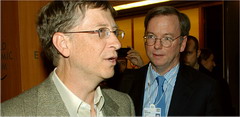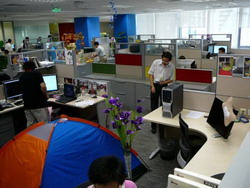Challenging Viacom and Microsoft, Google CEO feels happy
- Transfer
 In 2000, when one of his friends advised him to get a job at Google, Eric Schmidt thought: “Where? This is just a search resource. ” And Everest is just a mountain. Since then, Google has become the most influential corporation of its time, and Schmidt has become its chief executive and multi-billionaire. Today, Google is at a crossroads. With over ten thousand employees, the tension between corporate control and creative chaos has never been higher. Wired caught Schmidt on Googleplex , where he announced plans to experiment with video advertising on YouTube, rejected Viacom’s lawsuit, acknowledging it as the next move in the business game and indirectly confirming that Google Apps threatens Microsoft’s monopoly.
In 2000, when one of his friends advised him to get a job at Google, Eric Schmidt thought: “Where? This is just a search resource. ” And Everest is just a mountain. Since then, Google has become the most influential corporation of its time, and Schmidt has become its chief executive and multi-billionaire. Today, Google is at a crossroads. With over ten thousand employees, the tension between corporate control and creative chaos has never been higher. Wired caught Schmidt on Googleplex , where he announced plans to experiment with video advertising on YouTube, rejected Viacom’s lawsuit, acknowledging it as the next move in the business game and indirectly confirming that Google Apps threatens Microsoft’s monopoly.  Wired:Microsoft CEO Steve Ballmer recently called Google "a company with only one business revenue." What are your thoughts on this?
Wired:Microsoft CEO Steve Ballmer recently called Google "a company with only one business revenue." What are your thoughts on this? Eric Schmidt: I see no reason in commenting on the words and actions of Steve Ballmer.
Wired: Well, to paraphrase the question: by and large, Google receives revenue from only one source - online advertising. It may be decided that the company’s business is not sufficiently diversified.
Schmidt: Criticism is justified. We get most of our advertising revenue, which today is a fairly popular business everywhere. But new income models are visible on the horizon. Perhaps the most interesting product, perhaps GoogleApps, in this area we have already begun to receive income from major transactions with companies.
Wired:Google Apps allows users to work in a text and spreadsheet editor, email client directly in a web browser. You store all user data somewhere in a huge server array. Will companies want to work in the same way?
Schmidt: Corporations are tired of struggling with the complexities of old models, our products are strong enough today to reliably serve the work of companies.
Wired: Does the success of Google Apps mean that Microsoft Office is losing market share?
 Schmidt: Maybe. Or, it may mean that consumers will provoke us to solve completely new problems.
Schmidt: Maybe. Or, it may mean that consumers will provoke us to solve completely new problems. Wired: In March, Viacom media claimant filed a lawsuit against Google, accusing YouTube of stealing video information. What made Viacom go to court?
Schmidt:Business games. We are negotiating with them, and I am sure that we will continue to conduct these negotiations more actively.
Wired: Viacom argues: you're not diligently removing copyright infringing videos from YouTube.
Schmidt: If they turn to the laws, they will realize that the Digital Millennium Copyright Act ( DMCA ) implies shared responsibility. The law says that first the copyright holders track - and after that we immediately remove the problematic clips. So we do. In fact, YouTube traffic has grown since we started doing this. So Viacom’s arguments that YouTube is somehow built on stolen information are certainly erroneous.
Wired:How can the copyright laws in the digital age be improved?
Schmidt: The balance that resulted from the DMCA is well supported. I think it will be better for all of us to work in these conditions today, when we introduce innovations. But with the growth of new technologies, any legislative act sooner or later has consequences that were not taken into account when it was created, which creates difficulties in its use.
Wired: You thought you were in danger of a lawsuit when buying YouTube. The deal did not take into account $ 200 million, which was supposed to go to legal costs. Why did you make a deal when you faced so many problems?
Schmidt:Because we are sure that YouTube is a fantastic service. We really think that the YouTube phenomenon will work for many, many years. The argument is simple: people use video clips everywhere, collectively, creating communities around. YouTube traffic continues to grow rapidly. Video is something that will be built in everywhere over time. From the perspective of Google’s development perspective, it makes sense to be the owner of the largest video web service.
Thanks to YouTube, anyone can now at any time witness how a group of Sun Microsystems employees teased young manager Eric Schmidt
Schmidt in 1986 : Obviously, we will be happy to work with licensed, copyrighted information, legally, and then make money on it. But YouTube can pay for itself - and this is something that critics do not take into account - by making money on a search service. Because, remember, when you go to YouTube, you do a search. After the integration of all Google search services, which we are actively working on, traffic will increase in all directions. This trick will be an occasion to create new information, and therefore increase the use of Google.
Wired:This encourages us to use the Internet more and more, which in turn generates more and more advertising revenue.
Schmidt: Caught right.
Wired: Does this mean that we will soon see ads on YouTube?
Schmidt: Sure. Advertising producers and their agencies often make videos that they don’t then use. For them, the Internet represents a new creative environment. Now they can create five to ten second short videos to attract online video enthusiasts to continue watching ads on TVs or show cut-out moments, as well as short versions of ads. This is only a small part of what creative people can do. We will see the emergence of new types of advertising and new ways of producing money.
Wired:Meanwhile, News Corp. and NBC Universal recently announced a joint effort to create their own online broadcast channel. Do they constitute serious competition for you?
Schmidt: No. They created an exclusive agent for licensing information content to anyone. In fact, the chief operating officer of News Corp. Peter Chernin and I talked about this for a long time. Before announcing the launch of the service, Peter explained to me in detail why their union would not compete with YouTube. I think this is the implementation of yet another effort to free up information.
Wired: You recently joined the Google Board of Directors and started talking about potential collaboration between Apple and Google. What will it look like?
Schmidt:Google’s model of building broadband Internet and services fits very well with Apple’s powerful devices and services. We can provide an ideal place to store information for the tasks they solve.
Wired: Let's talk about these data centers. They change our attitude towards computers and everything connected with them. Explain.
Schmidt:It has already become apparent to everyone that an architectural shift is taking place today. Such changes occur every 10-20 years. The previous architecture was a proprietary network with a personal computer connected to it. With the new architecture, you are always online, each device can work with each application, applications are stored in a certain cloud. This is similar to the banking system in which your money is located, while you yourself do not manage this money.
Wired: How many data centers have you built?
Schmidt: A few dozen. Several large ones have been created, and some of them are already known in the media. But within a year or two, these very large data centers will become smaller. This is the direction where most of the capital spent by the company goes.
Wired:Google manages its own fiber optic network. Why?
Schmidt: Because we can control it. One of the positive consequences of the bursting Internet bubble of the 90s is the formation of a large number of fiber networks open today for use. People always assume that we have some kind of master plan, including telecommunication systems, whereas in reality, if you consider this as a solution to the problem of supercomputers, we just want to speed things up.
Wired: How should we take Google today?
Schmidt:First of all, take Google as an advertising system. Next - as a system serving the end user - Google Apps. Third, you can treat Google like a giant supercomputer. And the fourth way to treat Google - as a social phenomenon, including the company, the people of the company, the brand, the mission, the values - all that relates to this.
Wired: The company helps San Francisco and other cities to establish cheap public Wi-Fi. Why?
Schmidt:Remember, one of the critical things for Google is the number of users who have inexpensive or even free access to broadband internet. If someone else is going to subsidize this, we think that is excellent. If you have 10% broadband coverage in San Francisco and we increase that percentage to 50%, it makes people happier. We know that those who used to go to Google just to search for something will use our other services tomorrow. They will quickly become users of Google Calendar, Gmail, Google News or other services because they like performance.
Wired: The revenue and number of people working with Google have tripled in the last two years. How do you keep Google from crawling into bureaucracy or chaos?
 Schmidt:This is a problem that we will always solve. We analyze it every day and come to the conclusion that the best work model for Google-level companies is small groups that act as quickly and as united as possible. Attempts to ensure a tough order freeze our creativity. Maintaining a balance between creativity and the system is what you need in a well-functioning corporation. But we control certain things. For example, now we are not turning a blind eye to the behavior “Hey, I want to have my own database and still have a nice time”, which was effective for us in the old days.
Schmidt:This is a problem that we will always solve. We analyze it every day and come to the conclusion that the best work model for Google-level companies is small groups that act as quickly and as united as possible. Attempts to ensure a tough order freeze our creativity. Maintaining a balance between creativity and the system is what you need in a well-functioning corporation. But we control certain things. For example, now we are not turning a blind eye to the behavior “Hey, I want to have my own database and still have a nice time”, which was effective for us in the old days. Wired: Do you, Larry Page and Sergey Brin still share your responsibilities in the same way as before?
Schmidt:About the same. Today, Larry and Sergey spend the whole day in the boardroom, doing product reviews. I talk with some managers, negotiate with a couple of partners about potential deals, and the three of us appear on stage for a few minutes to answer some questions from the workers. This is a typical daily routine.
Our skills are also perfectly complementary, as it was five years ago. Larry and Sergey have an excellent technical understanding of issues, while solving some problems they are faster than me. They are very clear-minded people. My task in this case is to know how to achieve corporate growth. I think this combination works just fine, and at least nothing will change here. We plan to work this way for a long time.
This text is a translation of the article “As Google Challenges Viacom and Microsoft, Its CEO Feels Lucky” by Fred Vogelstein, from Wired magazine # 05.15, May 2007.
Selected illustrations and videos are taken from the following sources:
Google logo, Earth Day - April 22, 2004: www.google.com/holidaylogos04.html
Eric Schmidt www.cable360.net/cableworld/technology/strategy/21493.html
Wired www.wired .com
Google office in China www.habrahabr.ru/blog/office/5252.html
You Tube Eric Schmidt-1986 www.youtube.com/watch?v=Po3gW7xVvoE
Eric Schmidt's homepage ericschmidt.com
When reprinting a translation, please refer to the original and real text.
The author of the translation will be grateful for comments, comments, corrections of possible inaccuracies and participation in the adjustment of the translation of the interview.
Original interview text www.wired.com/techbiz/people/news/2007/04/mag_schmidt_qa
Full interview www.wired.com/techbiz/people/news/2007/04/mag_schmidt_trans?currentPage=all
